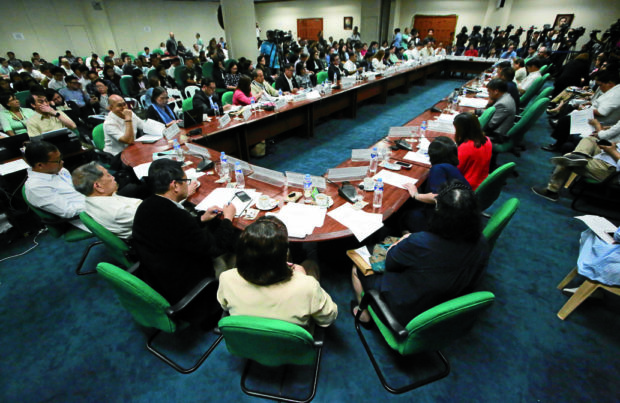Congress ratifies tax reform bill

FILE – The Senate Committee on Ways and Means headed by Senator Sony Angara meets Department of Finance, Bureau of Internal Revenue, and National Tax Research Center officials on a hearing to discuss the proposed Tax Reform Bill on Wednesday, July 12, 2017.
INQUIRER PHOTO / GRIG C. MONTEGRANDE
Updated 11:20 p.m.
Congress has finally ratified the controversial tax reform measure that would raise the take home pay of 7.5 million individual income tax payers and at the same time impose higher taxes on fuel, cars, tobacco, coal and mining, among others.
Voting separately, the Senate and the House of Representatives adopted late Wednesday the bicameral conference committee report on the tax reform measure also known as the Tax Reform for Acceleration and Inclusion (Train) bill.
In the Senate, 16 senators voted to adopt the bicam report while four were against it.
The four who voted against bill were Senators Bam Aquino, Panfilo Lacson, Risa Hontiveros and Antonio Trillanes IV.
Except for Lacson, the three oppositors belong to the Senate minority bloc.
It was Aquino, who first objected when a motion was made to adopt the bicameral conference committee report on the measure. Lacson followed suit.
The objection by the two senators prompted the chamber to conduct a nominal voting.
With the ratification of the two chambers, the measure would now be transmitted to President Rodrigo Duterte for signature.
“Ibinaba na po natin ang kaltas sa buwis simula next year, may mas malaking ginhawa pang naghihintay pagdating ng 2023,” Senator Sonny Angara, chairman of the ways and means committee, said in a statement.
“Ito ay para hindi na mapag-iwanan ulit ng panahon ang tax rates na nagresulta sa napakataas na buwis na hindi na patas para sa mga ordinaryong manggagawa. Alinsunod din ito sa pangako ng administrasyong Duterte na hindi buwisan pa ang kumikita ng P20,000 pababa,” Angara added.
The following are among the salient features of the bill based on the media briefer released by Angara’s office:
- Exempt from tax individuals with P250,000 annual income and below starting 2018.
- Raise the tax exemption for the 13th month pay and other bonuses to P90,000 from the current P82, 000.
- Exempt from value-added-tax (Vat) the sale of drugs and medicines prescribed for diabetes, high cholesterol, and hypertension starting 2019.
- Exempt all milk from tax “given its nutritional value.”
- For fuel petroleum products, new taxes will be imposed on LPG — P1 in 2018, P2 in 2019, and P3 in 2020. For diesel fuel, a P2.50 tax would be imposed starting 2018, P4.50 in 2019, and P6 in 2020. Meanwhile, the tax on regular and unleaded premium gasoline would be raised to P7 in 2018, P9 in 2019 and P10 in 2020 from the current P4.35.
- Impose a P6 tax per liter for beverages using caloric and non-caloric sweeteners and P12 per liter for beverages using high fructose corn syrup.
- Raise the excise tax on automobiles. Those valued up to P600,000 and up would be imposed a 4 percent tax; 10 percent for P600,000 up to P1.1 million; 2o percent on over P1.1 million to P2.1 million and 50 percent on over P2.1 million.
- Impose a 5 percent tax on cosmetic procedures, surgeries and body enhancements.
- Double the prevailing documentary stamp tax rates fromP1.50 to P3.
- Increase the coal excise tax from P10 to per metric ton to P 50 per metric ton in the first year of implementation; P100 in the second year, and P150 in the third and succeeding years.
- Double the excise tax rates on all non-metallic minerals and quarry resources, and all metallic minerals including copper, gold and chromite from the current 2 percent to 4 percent, and on indigenous petroleum from the current 3 percent to 6 percent.
- Raise the excise tax on tobacco products from the current P30 per pack to P32.50 from January to June next year, P35 from July 2018 to December 2019, P37.50 from 2020to 2021, P40 from 2022 to 2023 and a 4 percent annual indexation in 2023 onwards.
The higher tax on tobacco was not contained in the original proposal but it was inserted during the bicameral conference committee meetings.
Angara said the projected revenue from new and higher taxes could reach P130 billion.